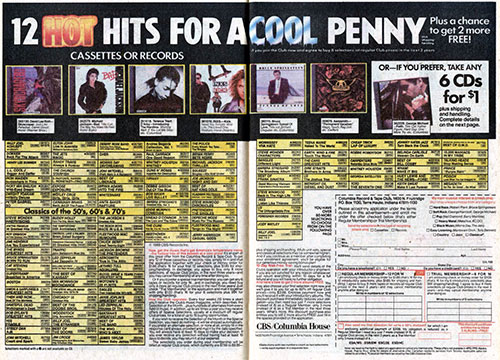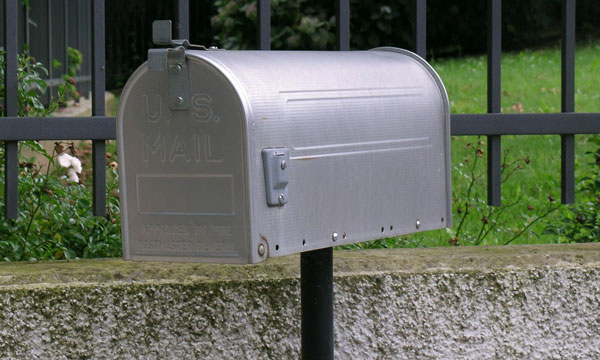The First 12 Cost A Penny, But …
In the 1980s and 1990s, Columbia House could do no wrong—as a way to get music, the mail-order service was cheap and easy at first. Then, the bills came.

The perks of signing up for Columbia House
AOL may have had the most prevalent mail-and-magazine-based marketing campaign of the '90s, but a close second goes to both Columbia House, which was owned by Sony, and BMG, which was owned by RCA.
It was a common sight in magazines of all shapes and sizes to see ads like the one above, which promoted extremely cheap collections of music in exchange for signing up for a membership. It even singlehandedly helped some CDs become hits—Hootie and the Blowfish, for example, is said to have sold 3 million copies of Cracked Rear View through the service.
And if you watched cable TV during the early '90s, you probably saw a few commercials for the service. One in particular rivals that recent viral Sizzler promo on the commoditized patriotism front.
But laugh all you want, snake people: Columbia House's pitch was effective because it was, on the surface, a great deal. A dozen CDs sound like nothing in the age of streaming and MP3s, but it really was a solid carrot back then.
The problem was, there was a stick—and a painful one at that.
"Most times when you’re trying to get somebody to buy something, you are actively trying to get them to go and buy the thing, even if now it’s clicking or subscribing and subscription. Columbia House had this brilliant, perverse method which was [that] you sign up and then all you have to do is tell us not to send you things, and if you don’t remember that, we are going to sell you something and you have to pay for. And enough people will like that? Okay. And it was a profitable business. Could you ever get anyone to do that again?"
— Sasha Frere-Jones, the former New Yorker writer, discussing with_A.V. Club_ the Columbia House business model, which he's intimately familiar with—because he used to work for the company back in the early '90s. Frere-Jones worked at the company during the day while boning up his music-journalism chops at night, writing for various zines. If you want to get a better idea of what it was like to work at Columbia House, read the A.V. Club piece, and watch The Target Shoots First, a first-person documentary on the life of a Columbia House manager.
Five reasons Columbia House was able to give away records so cheaply
- Degraded audio quality. In 1994, Stereophile magazine published a feature analyzing whether the quality of the Columbia House or BMG CDs was actually much lower than one could find in a traditional record store. The belief—which hasn't been confirmed—was that the service was using lower quality master tapes, and on high-quality equipment, one could tell the difference.
- Lack of royalty payments. Mental Floss notes that those free CDs generally cost Columbia House $1.50 each to create—a fairly low amount of overhead in those days. The reason it was so low? Well, they didn't have to pay royalties on the giveaways and made the money back on the margins. In other words, that Nirvana album you got for free from Columbia House netted Kurt Cobain a grand total of $0.
- A sketchy business model. The model that the company used relied on customers essentially forgetting that they had subscribed to the service—and sending random CDs or cassette tapes to people that haven't asked for them, along with a bill. Not exactly a way to make friends.
- High profits after the freebies run out. After you got those cassettes and discs shipped your way, the company charged high amounts to consumers—but they also kept most of the profits on the albums sold. Mental Floss suggests that the company made as much as $7.50 on each album shipped.
- Aggressive bill-collection tactics. Ripoff Report and Consumer Affairs each have report pages on the service and its collection agency, Trident Asset Management, that go back for miles. If you haven't paid for those CDs you got back in the '90s, they're probably still trying to shake you down for your money.

If Columbia House ships you something you didn't ask for, you don't owe them a damn thing
The business model that Columbia House and BMG use is actually something of a precursor to Spotify and other online subscription services.
Columbia House and BMG were the most prominent proponents of negative option billing, which has a history of being used by "of-the-month" clubs. You can't opt out unless you specifically ask to, and if you don't, they're going to ship you more stuff. It has a lot in common with subscription services like gym membership, except for one thing: Because they bill you after the fact, they set the terms.
"Negative option marketing can pose serious financial risks to consumers if appropriate disclosures are not made and consumers are billed for goods or services without their consent," a Federal Trade Commission report on the practice states. "With the explosion of Internet marketing over the past ten years, negative option offers are as much a fixture of online advertising as in any other advertising media."
Obviously, this kind of marketing has become even more of a problem online, but fortunately you have some legal precedent in your favor. For one thing, you don't have to pay for unsolicited merchandise according to federal law.
An example of this is a book service with a similar model, Bottom Line Books. In 2012, Consumer Affairs reporter Mark Huffman wrote about situation where a reader of theirs received a book they didn't ask for, along with a bill. He recommended sending Bottom Line Books and similar companies a letter.
"While you are not obligated to send a letter to the company stating your intention to keep the merchandise as a free gift, it's usually a good idea to do so," he explains. "Your letter may stop the company from sending you repeated bills, and if it's simply an honest mistake, the letter may help clear the air. You should send the letter by certified mail and keep the return receipt and a copy for your files."
So, in case you're wondering: Yes, Columbia House is still around. But not in the way you remember. The company, which was acquired by BMG back in 2005, has no ties to the record industry at this juncture. It doesn't even sell CDs.
Instead, it relies on a similarly easy-to-ship entertainment product that hasn't been totally screwed over by digital media as of yet—the DVD. After a set of mergers, Columbia House is now owned by a company called Direct Brands, Inc., which also owns BookSpan, the direct descendent of the Book of the Month Club.
Based on the company's Glassdoor reviews, Columbia House and its parent company are both dying a very slow, prolonged death. Perhaps as it should be.
:format(jpeg)/2018/04/tedium061115--1-.gif)
/2018/04/tedium061115--1-.gif)

/uploads/ernie_crop.jpg)